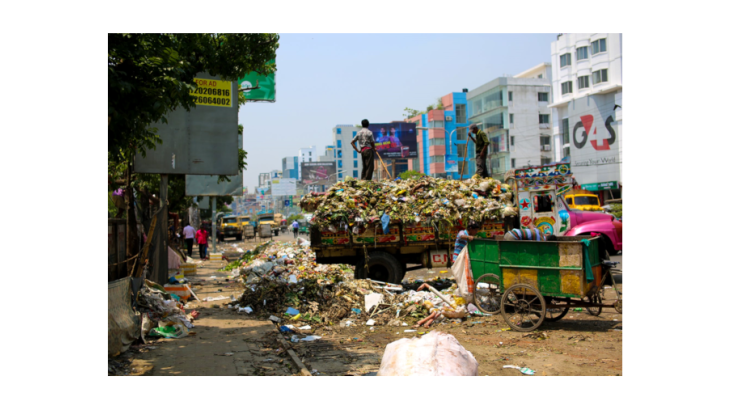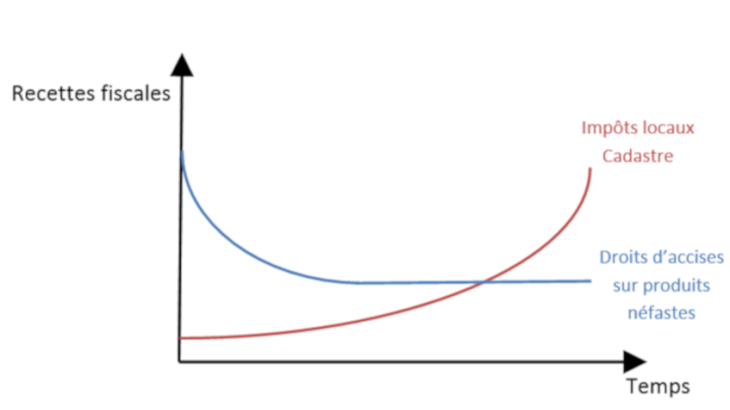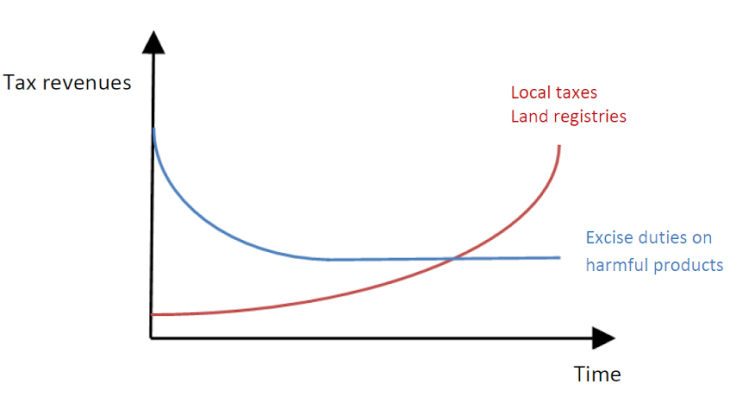- Home
- Publications et statistiques
- Publications
- What if one solution was to empty your n...
Post n°191. The lack of waste management remains as harmful to the environment as civil aviation or merchant shipping. Financing these sectors, particularly in developing countries, remains complex: waste recovery is not profitable. How can these difficulties be overcome? What are the long-term benefits, locally and for the planet? This post explores some avenues including alcohol and tobacco taxes as a source of transitional funding.

Climate change is the term used to describe the change in the composition of the Earth's atmosphere. It has many consequences, including rising temperatures that will drive some populations to drastically change their lifestyles. Northern European countries will be able to take advantage of milder temperatures, but the majority of African countries will have to adapt to extremely hot temperatures. This North-South divide is especially pronounced when we consider poor waste management, which is a major source of greenhouse gases and increases the climate risk even more.
Waste management, worldwide, an action to combat climate risk
This post suggests that waste management, a topic that receives little media attention, should be considered as a solution for mitigating global warming. According to the United Nations Environment Programme (UNEP), the climate impact of household waste is globally equivalent to that of civil aviation or merchant shipping, i.e. a non-negligible impact.
In France, household waste management is strictly organised. The division of responsibilities between regions, départements and municipalities in this area allows for optimised waste management in rural and urban areas alike, as well as the involvement of French citizens who recycle and use bins for sorting the waste intended for treatment centres. Although there is always room for improvement in the recycling chain, the system works well overall. Given the climate emergency, it is becoming necessary for all countries to adopt a similar system.
In developing countries (DCs), public landfills for household waste contain a multitude of different objects, but above all remnants of organic matter. This part of waste bins becomes harmful if it decomposes without oxygen (the case of waste heaps) because the remains in question will release methane gas. This greenhouse gas lives less long in the atmosphere than CO2 (ten years against more than a century), but it has a warming capacity 28 times higher than the latter. From Lagos in Nigeria to Praeksa in Thailand, thousands of tonnes of waste are decomposing and releasing massive amounts of methane gas. The problem is that the number of landfills is constantly increasing. According to the GoodPlanet Foundation, municipal waste (from households, commercial and public activities) is expected to double in the next 15 years and developing countries will be the main contributors to this growth.
Meeting the cost of global waste management
By investing in treatment and recovery infrastructures, France has succeeded in managing its waste. Beyond investment, the operating expenses for collecting, sorting, recycling or transforming waste are covered by public revenues. The problem in DCs stems from the lack of funding, especially since waste recovery does not yet make the waste sector profitable. Lastly, it should be stressed that if official development assistance flows were to fall in the coming years because of the decrease in donor resources due to COVID-19, the financing of these sectors would be undermined.
Seven of the 17 Sustainable Development Objectives (SDOs) address the issue of waste, highlighting the underfunding of the sector. How will countries with little fiscal leeway be able to finance projects of this magnitude? Generally, local taxes are used to finance the stakeholders involved in the waste management process because of the local nature of the service provided. However, DCs are struggling to collect these local taxes, which are mainly related to property or land-ownership, because of the absence or poor quality of land registries necessary for the work of the tax authorities. Improving the quality of land registries takes time, so financing waste management requires transitional funding.
Transitional financing options as an alternative to local funding?
One possibility would be to finance the waste sector through tax levies on products that are harmful to the health, such as tobacco or alcoholic beverages. For instance, using taxes that encourage healthy consumption to finance an environmental investment is a consistent and comprehensive approach that addresses both the harmfulness of the products consumed (alcohol/tobacco) and the environmental impact (especially for local residents) of landfills. However, earmarking the revenue generated by these taxes on harmful products can only be a transitional solution since the tax base - tobacco or alcohol consumers - have an incentive to reduce their consumption, which will ultimately reduce excise duty revenue.

A long-term objective on a global scale
The problem of public landfills seems to be an insurmountable challenge given the quantities of waste involved. However, it should be stressed that DCs are not new to the field of waste management because the informal sector often controls the organisation of the waste sector. Financing the latter would make it possible to formalise the employment of thousands of workers, giving them access to social security at the same time. Setting a long-term objective for waste management requires progress in three areas:
- reducing the impact of household waste on climate change,
- improving the health of people living near landfill sites, and
- offering a new life to informal workers in these sectors.
Far from being a pipe dream, such projects have already been successful. For example, in some neighbourhoods of Lima in Peru, the introduction of the Recycler's Law in 2009 resulted in the formalisation of many waste pickers.
Addressing waste management has rarely been considered as a solution to global warming, and taking care of our neighbours' waste even less so. Yet DCs' waste seems to be a cause on which we can act. While the solution proposed in this post is generic, it would be necessary to study the tax systems of each country prior to any tax implementation. As every tax system has its weaknesses as well as its opportunities, financing sustainable waste management should be feasible.
Eco Notepad launched its 2020 competition to encourage students to express themselves freely on the issue of climate change. Thus, Bloc-notes Eco wishes to allow all opinions to be expressed as long as they are well-founded, even if they do not necessarily reflect the theses defended by the Banque de France. The winners were selected by a jury of renowned experts and researchers. The opinions expressed in the winning entries are those of the authors. They do not in any way reflect the position of the members of the jury, nor that of the Banque de France.

Source: Author
Note: Excise duties should decrease and then stabilise at the level of incompressible consumption, while local taxes collected will increase with the quality of land registries and tax authorities.
1st prize-winning blog in the 2020 Eco Notepad Challenge - by Mathilde Salin et Louis Daumas : To avoid shipwreck, imagine a "stranded-compensated" principle
Second prize-winning blog in the 2020 Eco Notepad Challenge - By Eugenie Ribault : What if one solution was to empty your neighbours' waste bin?
Concours du blog pour les étudiants 2020 - Remise des prix (FR-EN)
Updated on the 25th of July 2024